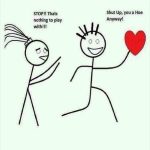Child Sexual Abuse in the Black Community – Survey Results
Back in 2011 I put together a survey on sexual abuse of minor children in the black community. The survey was quite comprehensive, and took many weeks to develop. Well, today I peeped at the database on the server (something I haven’t done in quite awhile), to see what result data has been collected over the years. The survey closed in October 2014 after running for four years, with a total of 8,752 responses.
NOTHING LIKE THIS HAS EVER BEEN DONE ON THIS SCALE and focused specifically on black Americans. I am the first. I am the only. And this data, collected from both men and women, is some of the most enraging testimony to the sickness in the hearts of men. These abusers were tasked with protecting and loving children, not using them for sordid sexual acts. I’ve never been so disgusted in my life.
Since there is so much data I am going to reach out to a statistician friend I have and see if she can help me tabulate this data properly, but please read on for some of the highlights I think you’ll find quite disturbing.
Keep in mind as you read that all responses may not add up to be 100%, as respondents could in many instances select more than one answer.
_________________________
Total Survey Responses
8752
Gender of Respondents
Female: 92%
Male: 8%
Race of Respondents
46% Afro Caribbean
46% African American
and the rest others
Race of Assailant
93.8% African American / Black
Primary Age Group of Respondents
45-54 with
25-34 a close second
Crime Committed
81.6% molestation
37.4% attempted molestation
31.1% rape
21.1% attempted rape
Role in Sexual Abuse
88.9% victim only
17.4% witnessed abuse of another child
12.1% told about abuse by a victim
4.7% admitted to being a victim who later abused others
Age of Abuser
28.9% were younger than 13
22.1% were 14-16
15.8% were 17-19
15.8% were 20-25
14.2% were 26-30
17.9% were 31-40
5.8% were 50 or older
Age of Victim of Abuse
54.2% LESS THAN SEVEN YEARS OLD
36.8% 8-10 years old
26.8% 11-13 years old
10.5% 14-15 years old
Relationship to Perpetrator: (again, numbers do not add up to 100% as some victims had multiple perpetrators and molestations/rapes during their lifetime with different relationships to the perps)
37.5% Male Family Friend
27.9% Male Cousin
15.3% Mother’s Boyfriend
12.5% Female Cousin
12.5% Brother/Step Brother
12.5% Male Church Leader/Church Member
11.6% Uncle
10.5% Neighbor
9.5% Step Father
6.8% Male Stranger
6.2% Parent or other relative of Childhood Friend
6.2% Brother in law
6.2% Coach or Club or Scouts Leader
Now this is here we asked about how the molestation and rape affected the victim. Respondents could check as many boxes as applied to their feelings.
Emotional Impact of Childhood Molestation/Rape
55.8% felt worthless and ashamed
44.2% became depressed and/or suicidal
42.1% developed an inability to love or establish close relationships
40.0% report that their self-esteem disappeared completely
38.4% became promiscuous
35.8% became distrustful and suspicious of everyone, resulting in no close friendships
31.6% became violent and angry at the world
31.6% became possessive and insecure in their relationships
28.9% stopped caring about their appearance and became withdrawn
23.2% started having nightmares and/or wetting the bed
21.6% began abusing themselves (anorexia, overeating, cutting, etc.)
15.3% failed school or dropped out altogether
5.3% were removed from home and placed with other relatives
5.3% contracted an STD which required medical treatment
There were also dozens of other responses filled in using the OTHER box.
Frequency of Abuse
Frequency of abuse ranged from several times per week (18.9%) to occasionally over a period of years (16.8%) to a few times per month (13.7%) with 3.7% of respondents reporting having been abused on a daily basis. The most commonly reported type of abuse the respondents were subjected to as children follows:
89.5% inappropriate touching of their body
43.7% sexually oriented conversation
30.5% oral sex performed on perpetrator
28.9% vaginal rape
27.9% threats of violence if victim failed to comply
27.4% oral sex performed on victim
21.6% shown pornographic images or films
13.2% report being anally raped
11.1% were flashed
There are dozens of other responses ranging from peeping to forced prostitution to dry humping or beng forced to masturbate the perpetrator, or watch the perpetrator masturbate.
We then asked how much time passed before the respondent told someone about what happened to them. The answers will shock you.
22.1% waited more than 10 years to tell someone
17.4% never told anyone until now
15.3% shared that more than 20 years passed before they told (most of them also checking the “until now” button!)
Folks saying they will pray for the victims need to stop wasting their breath. Prayer doesn’t do shit. All these children prayed for help, for relief, for the abuse to stop. Praying never helped.
16.8% believed that asking God or Jesus for help would take care of things
15.8% wished God Jesus or someone would strike their abuser dead
13.2% prayed the abuse would just stop
10.0% prayed and hoped that no one would find out
Why did they not tell what was happening to them as children?
57.4% said they felt too embarrassed
40.0% were so innocent they didn’t understand that what was happening to them was sexual abuse until they were older
37.4% said they thought no one would believe them anyway
35.8% didn’t know who to tell
35.8% were afraid the family would break up if they said anything
15.3% believed they were being punished for being bad in some way
11.1% believed the abuser really did love them as he said, and that was how love was demonstrated
Treatment for Abuses
A total of 54.2% of respondents say they never received any sort of treatment for their abuse – no medical treatment, no psychotherapy, and no counseling. They were left to deal with the trauma on their own as a mere child.
Suggestions for Parents to Prevent Childhood Sexual Abuse
Like I said, the survey was quite comprehensive and asked a total of 30 questions, with room for optional narratives at the end. Respondents were asked to provide up to three pieces of advice to parents which could be used to help protect children from abuse.
Repeatedly the respondents begged mothers to do the following:
- Be VERY, VERY selective about who spends time around your child, especially alone with them. Do not trust any man around young children. Ask the child who they prefer to babysit – kids are very clear about who they trust and who they feel uncomfortable with. Even women. You may trust her and she would never hurt your child – but what about her husband, her boyfriend, her teenage sons, and her brother?
- Talk to your children openly about sexual abuse. Educate them about molestation and appropriate touches, privacy when dressing and bathing, etc. Make sure they understand proper and improper ways to show affection. Do not allow adults or teens to play wresting or tickling with your children under the guise of “having fun.”
- Make sure your children feel comfortable talking to you about anything. Let them know repeatedly that they can tell you anything, no matter how confusing or scary, and you will always be on their side and believe them. Always believe your child, no matter how hard it is to believe about the person they say is hurting them. Let them know that you trust them. Put their needs before yours – they didn’t ask to be here.
If black parents followed just these three pieces of advice, the trauma suffered by millions of young black girls and boys could be eliminated within two generations. Diligence on the part of all parents is required, along with a steadfast refusal to blindly trust anyone just because you like them or someone in your family is friendly with the are mandatory.
If we are to stop the generational practice of sexual abuse and secrecy in black families, and protect current and future generations of black children from the mental, emotional and physical pain of sexual abuse we must all take immediate and decisive action.
 Deborrah Cooper
Deborrah Cooper
Social Researcher, Author and Advice Columnist
SurvivingDating.Com
AskHeartBeat.Com
YouTube.Com/Debsterism
Find my books on Amazon
Category: Society and Culture



















